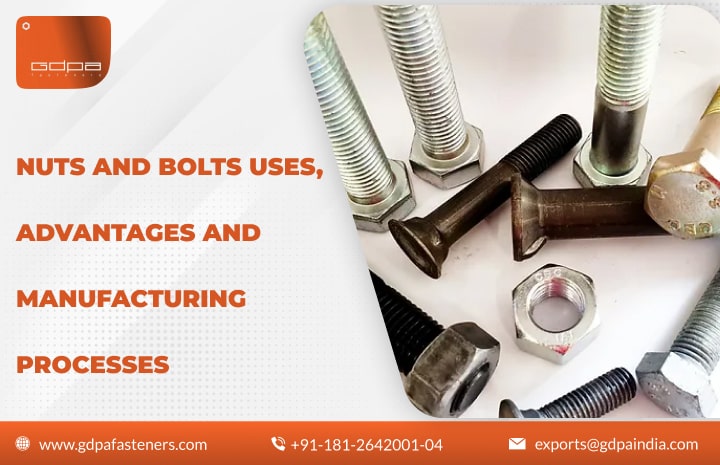
All types of fasteners perform the same task, which means they are used to secure two items together. The commonly used fastener categories are nuts and bolts which are best for making the non-permanent joint. If you think that you may have to disassemble the joint, then you can use nuts and bolts. Well, in today’s blog, we’ll discuss different uses of bolts and nuts, their manufacturing processes along with their advantages. Let’s get started:
What Does Nuts and Bolts Mean?
Nuts and bolts are important elements of machines that are used to attach two different parts together without causing any type of damage. They are the smallest tools and come with numerous benefits. If you don’t use these tools, then mechanical construction would be difficult. They come in a small size, but they have the power to hold the whole machine together. Before you start any type of mechanical activity, you must know about bolts and nuts, the type of material used to manufacture bolts and nuts, how you can use them effectively and much more about these fasteners.
What are Nuts and Bolts made of?
Bolts and nuts can be made using different types of material. Basically, it completely depends on the fastener manufacturers what type of material they want to use to manufacture fasteners. If we talk about commonly used materials to manufacture fasteners, then the names of materials are: steel, alloy steel, silicon bronze, brass, aluminum, chrome, and titanium.
Where are Nuts and Bolts made?
Basically, fastener manufacturing companies manufacture fasteners, such as nuts, bolts, screws, washers, etc. They use different manufacturing processes to deliver high-quality fasteners.
How Nuts and Bolts are made?
Different processes to manufacture fasteners are written below:
-
Cold Forging
Another name for cold forging is cold roll forming which is considered the best fastener-making process because of its low waste. Generally, it is quite similar to machining, which means it is done at or near room temperature. This process is effective in producing fasteners in bulk.
-
Machining
Machining is considered the best fastener-making process that is useful in deforming the metal to make components and parts. The material can be moulded and bent to get the required results or patterns by drilling, turning, milling, grinding, and cutting. Mostly, machining is done at room temperature, and heat is not used in this process.
-
Hot Forging
As the name implies, in the hot forging process to make fasteners, heat is used. Heating treatment is one of the most important aspects of the hot forging process. During this process, the distorted shape of metal is preserved when it cools down to the temperature at which the material is heated. The grain structure of the material is broken down and standardized into a finer grain during the shaping and formation process that enhances ductility, strength and toughness. Hot forging is one of the best and most effective methods of manufacturing fasteners because it creates little waste.
Bolts and Nuts Uses
Nowadays, there is no such field or thing where nuts and bolts are not used. Fasteners are important in every field of construction. In our life, we use several machines, and these bolts and nuts are used in every machine. Take a look at the following applications of using them:
- To install heavy machines in wind farms, these fasteners are used to fix their inner parts.
- Fasteners are used in the machines of solar thermal plants.
- In the construction field, they are widely used.
- The machinery where their inner parts need to be attached, then you can use them.
- The gas valves and water pumps can also be fixed with the help of bolts and nuts.
Benefits of Using Nuts and Bolts
Fasteners are an important part of making a robust connection between different parts of a particular project or machine. The following are some benefits of using nuts and bolts:
- The primary benefit of using bolts with nuts is that they are commonly used everywhere, especially in machinery.
- Another advantage is that they can be easily installed if one knows how to use them properly.
- If you are using large bolts and nuts, then you may need someone’s help when you are tightening or loosening them.
- Another advantage of using fasteners is that they are resistant to corrosion.
Conclusion
The blog shares information on different applications of nuts and bolts, the benefits of using them and manufacturing processes of fasteners. If you are looking to buy fasteners, then make sure to contact a reliable fastener manufacturer.